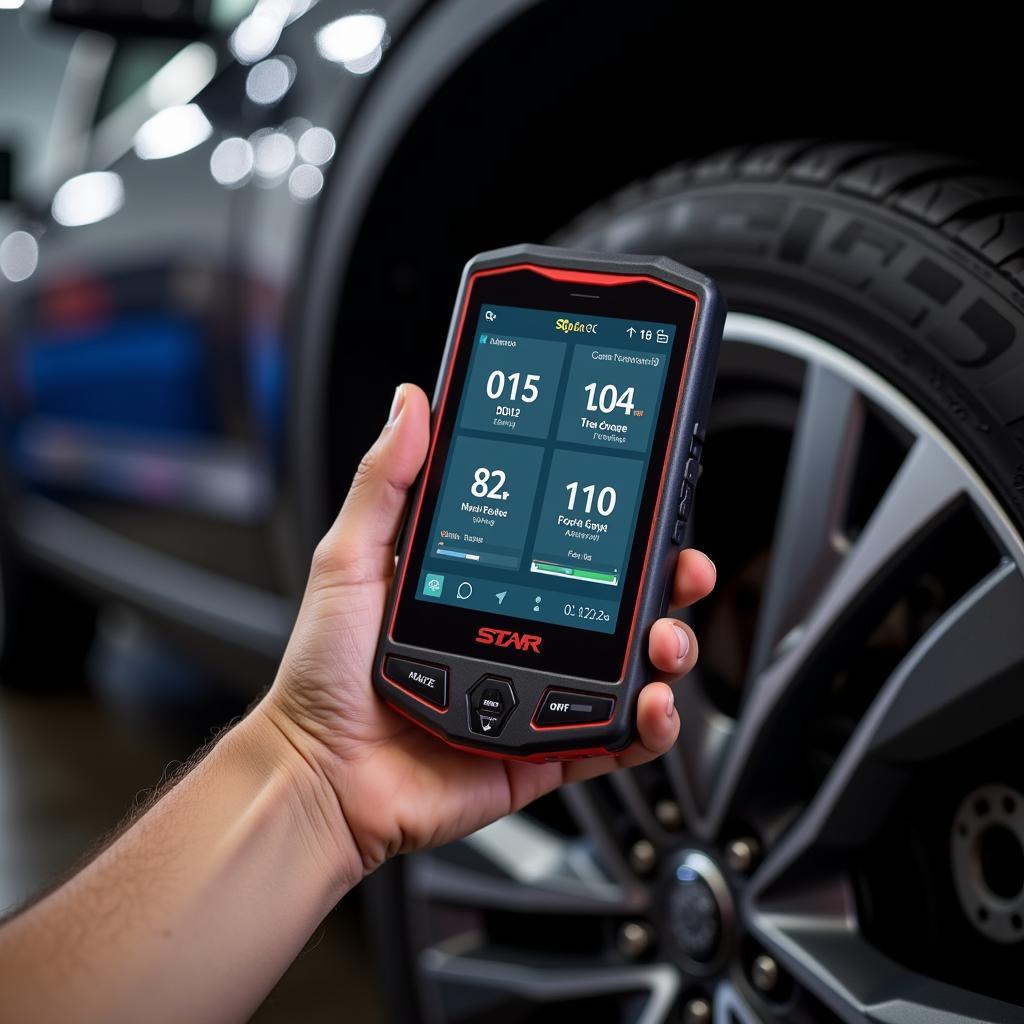Imagine having a car diagnostic tool that not only reads your engine’s codes but also provides real-time data on your tyre pressure and temperature. This isn’t a futuristic fantasy anymore, thanks to the advent of car diagnostic tools equipped with tyre sensor functionalities. But how do these tools work, what are their benefits, and are they worth the investment?
Understanding Tyre Pressure Monitoring Systems (TPMS) and Their Importance
Before diving into the world of diagnostic tools, it’s crucial to grasp the significance of Tyre Pressure Monitoring Systems (TPMS). As the name suggests, TPMS constantly monitor the air pressure inside your tyres, providing alerts if it detects any anomalies. This is crucial for several reasons:
- Safety: Underinflated or overinflated tyres can significantly compromise your vehicle’s handling and braking, increasing the risk of accidents. TPMS provide timely warnings, allowing you to address the issue before it escalates.
- Fuel Efficiency: Driving on tyres with incorrect pressure increases rolling resistance, forcing your engine to work harder and consume more fuel. A TPMS can help ensure optimal tyre pressure, leading to better fuel economy.
- Tyre Longevity: Incorrect tyre pressure can cause uneven wear and tear, reducing the lifespan of your tyres. TPMS help maintain proper pressure, maximizing the life and performance of your tyres.
Car Diagnostic Tools with Tyre Sensors Function: A Game Changer
While traditional TPMS alert you to pressure issues, a car diagnostic tool with tyre sensors takes it a step further. These advanced tools provide a comprehensive overview of your tyre health, offering insights beyond simple pressure readings. Here’s how they work:
- Wireless Communication: These tools utilize wireless technology to communicate with the TPMS sensors in your tyres, receiving real-time data on pressure and temperature.
- In-depth Data Analysis: Instead of just warning lights, these tools display detailed information on each tyre, including pressure readings, temperature fluctuations, and battery life of the TPMS sensors.
- Diagnostic Capabilities: Some advanced models can even diagnose issues with the TPMS itself, such as faulty sensors or wiring problems, saving you time and money on unnecessary garage visits.
The Benefits of Using a Car Diagnostic Tool with Tyre Sensor Integration
Investing in a car diagnostic tool with tyre sensor functionalities offers several advantages:
- Enhanced Safety: Real-time monitoring and detailed data allow you to proactively address tyre issues, ensuring optimal safety on the road.
- Improved Fuel Efficiency: Maintaining correct tyre pressure contributes to better fuel economy, saving you money in the long run.
- Prolonged Tyre Life: Monitoring tyre pressure and temperature helps prevent uneven wear and tear, extending the lifespan of your tyres.
- Cost Savings: Early detection of TPMS issues can prevent costly repairs and replacements in the future.
- Convenience: Accessing comprehensive tyre data alongside other vehicle diagnostics provides a holistic view of your car’s health in one place.
Choosing the Right Diagnostic Tool: Factors to Consider
The market offers a wide array of car diagnostic tools with varying functionalities and price points. When selecting one, consider these factors:
- Vehicle Compatibility: Ensure the tool is compatible with your vehicle’s make, model, and year.
- TPMS Functionality: Check if the tool supports both direct and indirect TPMS, as different vehicles utilize different systems.
- Data Display and Interface: Opt for a tool with a clear, easy-to-understand display and a user-friendly interface.
- Additional Features: Consider tools that offer additional functionalities like code reading, live data streaming, and component activation.
- Budget: Determine your budget and look for tools that offer the best value for your money.
Expert Insight:
“In the past, checking tyre pressure was a tedious manual task,” says John Miller, a seasoned automotive engineer. “Now, with these advanced diagnostic tools, you have access to a wealth of information at your fingertips. It’s like having a digital doctor for your tyres.”
Conclusion: Are Car Diagnostic Tools with Tyre Sensors Worth It?
In an era where technology is transforming the automotive industry, car diagnostic tools with tyre sensors function stand out as valuable assets. They offer a winning combination of safety, cost savings, and convenience, empowering car owners to take control of their vehicle’s health. Whether you’re a car enthusiast or simply seeking peace of mind on the road, investing in a quality diagnostic tool with tyre sensor integration is a decision that pays dividends in the long run.
FAQ
1. Can I use any car diagnostic tool to read TPMS data?
No, not all car diagnostic tools are equipped with TPMS functionality. Ensure the tool you choose specifically mentions TPMS support.
2. Do I still need to check my tyre pressure manually if I have this tool?
While these tools provide real-time data, it’s still a good practice to visually inspect your tyres regularly and check pressure manually for any discrepancies.
3. Can these tools program new TPMS sensors?
Some advanced diagnostic tools offer TPMS programming capabilities. However, this functionality may vary depending on the tool and vehicle model.
4. Are these tools difficult to use for someone with limited technical knowledge?
Many tools are designed with user-friendliness in mind. Look for tools with intuitive interfaces and clear instructions.
5. Where can I purchase a reliable car diagnostic tool with tyre sensors function?
Reputable online retailers and automotive stores offer a variety of options. Research different models and compare features before making a purchase.
Need further assistance?
If you have any more questions about choosing the right car diagnostic tool or need help with any car diagnostic issues, don’t hesitate to contact us. Our team of experts at DiagFixPro is available 24/7 to assist you. You can reach us via WhatsApp at +1(641)206-8880 or email us at [email protected].

